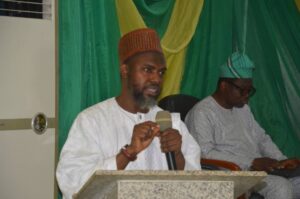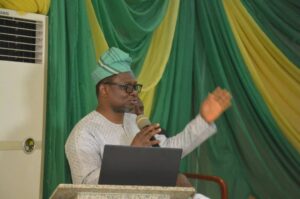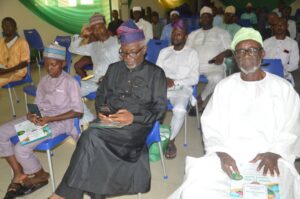Nigerians, particularly Muslims have been advised to seek expert intervention when they come down with physiological ailments.
The admonition was given by Muslim scholars and medical experts at the quarterly da’wah workshop of the Lekki Muslim Ummah (LEMU) held on Sunday 24, 2023.
Themed: ‘Sound Health, Sound Faith’, guest lecturers at the workshop explained that prayers alone are not sufficient to cure physiological ailments.
They, however, acknowledged that prayers can be used to complement orthodox medicine.
The galaxy of lecturers at the Admiral Jubrila Ayinla Multipurpose Hall, Lekki Central Mosque, venue of the workshop, included the Chief Clinical Coordinator at NSIA-LUTH Cancer Centre, Dr Muhammad Habeebu; Chief Head Dialysis Centre, Gbagada General Hospital, Dr. Abdulwaasi Busari; and Imam Lekki Central Mosque, Imam Ridwan Jamiu.
Others who spoke at the event chaired by Dr Waliu Buraimo were the director, of Ar-Rayaahn Natural Healthcare, Dr Qaasim Oyelakin and President of LEMU, Dr. Sola Labinjo.
– Islam supports medical intervention for ailments: Imam Jamiu
Imam Jamiu, who spoke on the topic, “Maintaining Good Health: The Islamic Teaching”, said Prophet Muhammad (SAW) supports expert intervention in handling ailments, adding that Islam only regulates the practice of medicine.

He said, “There was a day somebody fell ill, and the Prophet (SAW) told his companions to invite a doctor. He didn’t say since I’ve prescribed certain things for you to use or since the Qur’an is there for you, he said go and call a doctor. Some people specialise in the science and causes of illnesses and prefer solutions to them. So, it’s a science on its own (medicine).
“Religion will only regulate the practice of medicine. We have to go to the experts. Like the Qur’an says obey Allah, obey the messenger of Allah and the people of authority amongst you. When it comes to religious matters, we have authorities. When it comes to political matters, the authorities are our political leaders. When it comes to illness, we have experts, and we have to refer to them.
“As Muslims, we can use the things the Prophet prescribed. He prescribed them because of their curative and nutritive value, not that we should rely on them exclusively without seeking expert intervention.”
The Lekki Central Mosque Chief Imam meanwhile identified prayer as a key strategy in preventing and managing diseases, as he emphasised that everything lies with Allah.
He noted that Islam wants Muslims to take care of their health through preventive and curative measures.
“Islam wants us to take care of our health in about two ways. First is the one that has to do with preventive measures that Islam has given us. The second one is the curative measures. For preventive measures, there are certain things Islam taught us to do.
For example, when you eat, do not overeat and you do not eat certain things. You are what you eat. If you eat good food, it’s going to turn out to be good for your body, and vice-versa.
“There are some things science is just confirming to be bad, but the Qur’an has condemned them for so many years, like taking alcohol and pork. In Islam, we don’t eat carnivores like snakes, tigers and animals like that.
“Islam also encourages good personal hygiene as a preventive measure. This is why as Muslims, before you stand to pray in a masjid, you must be clean. If you look at the ablution we do, we wash areas that are often put to use and exposed. So, we wash them regularly to do away with microorganisms that are dangerous to our health, and so that we do not also transfer things that are dangerous to one another when we relate.

“Islam also teaches us to go for treatment when we are sick. The Qur’an says Allah knows that some of us may fall sick. Therefore, when we fall sick, we have to seek treatment. We should not say it’s Allah who has brought it, and if He wishes He would take it away. The Prophet (SAW) said Allah who has created diseases, also created their cures; you may know them and may not know them.
“Particularly, prayer is also part of the strategies Islam encourages us to adopt to prevent diseases. Everything lies in the hands of Allah,” he said.
Some ailments can only be cured with a spiritual strategy
Imam Ridwan clarified that there are some ailments that only spiritual strategies can cure. He said these include ailments caused by evil spirits.
“These cannot be cured in most cases through orthodox medicine. You have to use the spiritual way to drive out the spirit, by reading the Qur’an. We use the Qur’an to cure spiritual ailments,” he noted.
“However, for physiological ailments, we have to go to the specialists who are the physicians and the doctors. The Prophet (SAW) said we should seek treatment for our ailments because Allah who created the ailment has also created its cure. So, we definitely should go for the cure and pray as well.”
Early orthodox checks for cancer will save lives -Dr. Habeebu
In his lecture, “Cancer on a Rampage”, Dr Habeeb lamented that people do not show up early for orthodox treatment for cancer enough, adding that they would have sought alternative measures until the ailment gets to an advanced stage.
“The incidence of cancer in Nigeria is high and increasing. It is getting alarming. Unfortunately, most people who have it do not turn up for orthodox treatment early. They go around other things but orthodox treatment until it advances. They must have also drained themselves financially before showing up for orthodox treatment. Then, the treatment becomes just a palliative with no key outcome,” he said.

The Chief Clinical Coordinator of NSIA-LUTH Cancer Centre said cancer is on a rampage in Nigeria and across the world, calling for more awareness for people to go for screening and diagnosis.
“Cancer is rampaging in Nigeria and all over the world. There is a need for us to make concerted efforts to screen our populace and push the treatment of cancer into insurance so that people can pay for insurance. There is also a need to improve the standard of care and personnel treating cancer. There is also the need to step up awareness of cancer among our populace so that they can partake in screening and get the diagnosis early enough so that it can be worthwhile to treat them.
“Due to ‘japa’, we have many of our healthcare experts travelling abroad for greener pastures, thereby making it difficult for us to have the power to manage the disease. Also, our economy makes it difficult to find the equipment for treating exceptionally expensive cancer. So, it’s difficult to have private people come in to set up centres.
“In the entire country, we don’t have up to ten private centres where they treat cancer. It’s only the government, even the government is struggling to keep up with maintaining cancer centres. So, something needs to be done in that area. We can probably have indigenous production of part of this equipment to have enough to save the lives of cancer patients.”
Dr Habeebu, who is also a Senior Lecturer, at the College of Medicine, University of Lagos, said cancer incidence can be reduced through exercise and vaccination, but cannot be completely stopped.
He said spiritual methods can be added to treating cancer, warning, however that it should not be misused.
“If you have faith, you can add it to the normal treatment. It can help in the normal treatment. However, faith should not be misused. You should not go and be praying and leave the real treatment. After all, all of us go to work; we don’t have faith that money would come by staying at home. So, you only back up the right attitude with faith. You don’t use faith alone to treat cancer.”
Dr Busari highlights risk factors for kidney failure beyond alcohol, drugs
For his part, Dr Busari, who spoke on chronic kidney diseases and complications, said the instructions of Islam on alcohol, cigarettes hard drugs can contribute to less risk of chronic kidney diseases.

He was, however, quick to clarify that the risk factors for chronic kidney diseases are not only limited to alcohol and hard drugs.
“Alcohol, cigarette smoking, and hard drugs are risk factors that have been established to be driving these diseases altogether. If, as Muslims, we refrain from them, there are benefits we will get. This means the risk of coming down with hypertension and kidney diseases will be as low as we have adhered to. Anybody that does the same thing, whether they are Muslims or not, will get the same benefit. In a way, we would have reduced the prevalence.
“However, these are not the only causes. There are genetic factors, family history, increasing age, gender, and personality. These are things we may not be able to control. We call them non-modifiable risk factors.
So, we need to take into consideration all the preventive and management strategies like eating good diet, reducing salt and fat intake. These are halal things, but you have to take them moderately to prevent the risk of these diseases and their complications.”
The Nephrologist, who addressed the topic, “Dealing with common diseases”, said the rate of kidney diseases is alarming, adding that young people are also being affected.
“Chronic kidney diseases, hypertension and diabetes are becoming so rampant, and unfortunately these are diseases that are preventable if we know what to do about them. It is especially important to prevent complications because the complications make life shorter. A lot of patients die from stroke, heart failure, diabetes complications and heart attack.
“We should know that these diseases exist and they are increasing in terms of prevalence. Even younger individuals are becoming more affected by these diseases. Unfortunately, because of our healthcare system and individual attitude, a lot of people die from these seemingly preventable diseases. That’s why we emphasise more on preventive strategies.”

Dr. Busari appealed to the government to invest more in the management and treatment of kidney diseases because they are always capital intensive.
“The government needs to come in for kidney failure, because the cost of treatment is prohibitive. At least, a person doing regular dialysis will spend 120,000 naira. That’s the minimum. Therefore, the government is expected to subsidise or make sure there are facilities like NHIS and other social security to take care of the indigent people who will not be able to afford it. It’s like a death sentence when patients get to that stage.
“Prevention will go a long way to reduce the number of patients that are coming down with these diseases. The few ones that eventually come down with these diseases, and do not have the wherewithal to take care of them because they are capital-intensive — will have government come in.”



